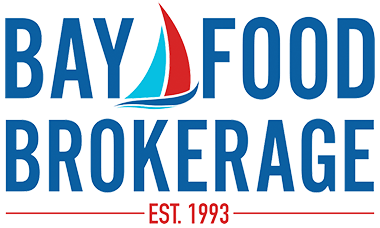
Selling to Supermarkets: Food Marketing Tips for Manufacturers
Are you a food manufacturer looking to sell your products to grocery stores? This post shares some valuable food marketing tips from our experts at Bay Food Brokerage to help you navigate selling to supermarkets.
Understand the Supermarket Industry
First, understanding the retail food industry is essential for food manufacturers and brands looking to market their products effectively. Supermarkets are the primary avenue through which consumers access a wide range of food products, making them a crucial distribution channel for manufacturers.
By understanding where grocery stores source their products and how they operate, food manufacturers can tailor their marketing strategies to align with the industry. This includes factors such as packaging, pricing and promotion. All of these play a vital role in ensuring successful product placement and sales at grocery stores.
Having a deep understanding of the retail food industry allows manufacturers to navigate the market effectively and establish a strong presence on supermarket shelves.
Understand the Food Retailers You Plan to Approach
Taking the first tip a step further, it’s important to have a grasp on the preferences of each individual retailer you plan to approach. What type of customer is the retailer trying to appeal to? Where in the store would your product be sold? What food brands represent your competition at each retailer?
Knowing the answers to these types of questions will play a major role in crafting a food marketing plan meant to appeal to target retailers. And, consider working with a broker who deeply understands retailers and has relationships with corporate buyers – like Bay Food does. This can provide a strong competitive advantage.
Create a Strong Food Marketing Strategy
In today’s competitive market, having a well-crafted food marketing strategy is essential for manufacturers looking to sell their products to supermarkets. When developing a pitch that will resonate with supermarket buyers, it’s important to understand:
- The latest retail food trends
- Consumer food buying habits
- Competitive landscape
- How to develop a compelling brand identity
By analyzing market data and staying up-to-date with evolving consumer preferences, manufacturers can tailor their strategies to captivate the attention of supermarket buyers. Perhaps that means emphasizing organic and sustainable practices. Or, maybe it’s leveraging the growing demand for locally sourced ingredients. Or, catering to certain dietary preferences.
In addition, the right grocery broker partner can help food manufacturers make smart decisions based on the latest retail food trends, supported by data. For instance, at Bay Food, we partner with SPINS, a leading provider of big data and analytics for the natural, organic and specialty products industry. This data offers insight into up-and-coming categories, how clients’ products are performing compared to competitors and more.
Effective Food Labeling and Packaging
Grocery stores often need packaging solutions that are both efficient and attractive. Retail food product packaging should meet the expectations of customers while also providing protection, convenience and product placement in stores.
Here are a handful of ways manufacturers can optimize food marketing opportunities related to packaging that appeals to retailers:
- Designed for appropriate placement in the store (for example, box on a shelf vs. hanging bag in the deli)
- Size and orientation designed to maximize shelf space
- Label clearly features product’s attributes, such as organic, gluten-free, keto-friendly, and the like
- Appeals to consumers’ preferences, such as uses recyclable materials and easy-to-use design
- Incorporates the latest graphic design-related food marketing trends to stand out from competitors on shelves
Building Relationships with Supermarkets
Building strong relationships with supermarkets is a critical component of a food marketing plan.
The first step in this process is understanding the needs and preferences of grocery store buyers, as mentioned above. By conducting thorough research and gathering insights, manufacturers can tailor their pitches to meet the specific requirements of each retailer.
Additionally, manufacturers can foster connections with buyers through networking events and industry trade shows. These opportunities provide a platform to showcase products and engage with potential buyers on a more personal level.
If your in-house sales team has been unsuccessful at selling directly to supermarkets, the right retail food broker partner can help. For example, at Bay Food Brokerage, we have strong relationships with the major retailers throughout the Southeast. A broker can help you:
- Get meetings with appropriate buyers
- Provide pitching and presentation strategy and support
- Make other suggestions for putting your best foot forward when approaching retailers
Promoting Your Products in Supermarkets
After a retailer has agreed to sell a product, it is crucial for manufacturers to effectively promote those products in stores.
One effective strategy is through in-store advertising and signage. By having eye-catching displays and prominent signage, manufacturers can grab shoppers’ attention and drive them toward their products.
Additionally, participating in promotional programs offered by supermarkets can greatly increase product visibility and sales. These programs often include discounts and special offers that entice customers to try the products, such as buy-one-get-one deals.
Another effective way to promote products is through product demonstrations and tastings. This allows customers to try the product firsthand and has been proven to increase purchase intent.
At Bay Food Brokerage, we work with our manufacturer clients to leverage and maximize these in-store opportunities. In fact, our retail team of representatives throughout the Southeast are boots on the ground for our clients. They meet with store managers, ensure proper signage, check inventory and so much more.
Food marketing with the purpose to sell to retailers can be a complex, time-consuming endeavor. For expert support through every step, contact us to learn how we can help you.
